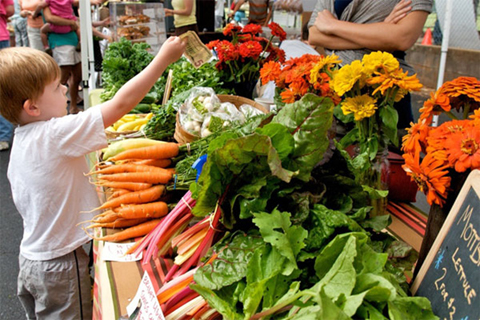College of Arts & Sciences faculty are tackling the challenges of the 21st century by building interdisciplinary and team-taught courses around a new set of curricular themes.
“In the space of a few months, Food Studies has gone from the proverbial mustard seed to an actual living green shoot pushing up through the soil,” says Dr. Theresa Moran, Visiting Assistant Professor of English.
Why study food?
“Food, its production, consumption and meaning, is of deep social, political, cultural and economic consequence. Food is at the heart of debates about globalization, science, technology, and social progress. The study of food is a growing area of scholarship that transcends disciplinary boundaries,” Moran says.
“The rationale for the Food Studies theme is that food helps to create cultural, national and regional identity and as well as personal relationships. The curricular theme of food allows students to think critically about an aspect of their lives – simultaneously deeply personal, public, and political – to which they can readily relate. Of course, Ohio University is uniquely positioned to offer an unparalleled experience for students interested in the study of food and food systems. Athens, a community nationally recognized as a regional food system model, is the perfect setting for Food Studies, with internship and volunteer opportunities readily available in the community which will strengthen students’ world-class educational experience,” Moran adds.
Themes are being developed by faculty across departments. “The recent Food Studies Retreat, with 24 faculty from 11 Arts & Sciences departments and one other college participating, demonstrated that there is a critical mass of faculty already working in Food Studies and that a critical mass of courses exists to create a curricular theme,” Moran says.
Food for Thought Speaker Series
To further develop a campus community engaged in the study of food and society, the Food Studies curricular theme group is also sponsoring Food for Thought, a wide-ranging, interdisciplinary series with speakers from the humanities, social and natural sciences. The Food for Thought speaker series opened with College of Arts & Sciences Dean Robert Frank on Sept. 25 on the topic “Eat, Drink, Taste, Smell: Cognitive and Perceptual Perspectives on Food Studies.” Environmental and Plant Biology’s Dr. Art Trese talked about “Revival of local, diversified agriculture”on Oct. 23.
The next event is Creative Writing’s Eric LeMay on Nov. 19 at 5 p.m. LeMay will talk on “Eating with Your Pen: Food Writing as a Gallimaufry of Genre.” Students, faculty and the community are welcome at all of these free events.
New Courses
Food Studies will have a new foundational course in Fall 2014—Introduction to Food Studies CAS 1400. This course is the foundational course of the curricular theme of Food Studies. Taught by a team of professors from the humanities, social sciences and natural sciences, Introduction to Food Studies encourages students to critically examine an aspect of their lives that is both deeply personal, public, and political. It will be open to all interested students and will be linked to two Learning Communities, notes Moran.
The team-taught Introduction to Food Studies Interdisciplinary Seminar will anchor two Food Studies Learning Communities. Three new courses, one in English, Classics, and Modern Languages, are under development to support Food Studies theme.
A library study guide page created by Alden Library’s Lorraine Wochna offers a selection of resources about the emerging world of food studies. The page also lists university resources and community events.
For more information on the Food Studies initiative, contact the Food Studies Project Leader, Theresa Moran at morant@ohio.edu.




















Comments